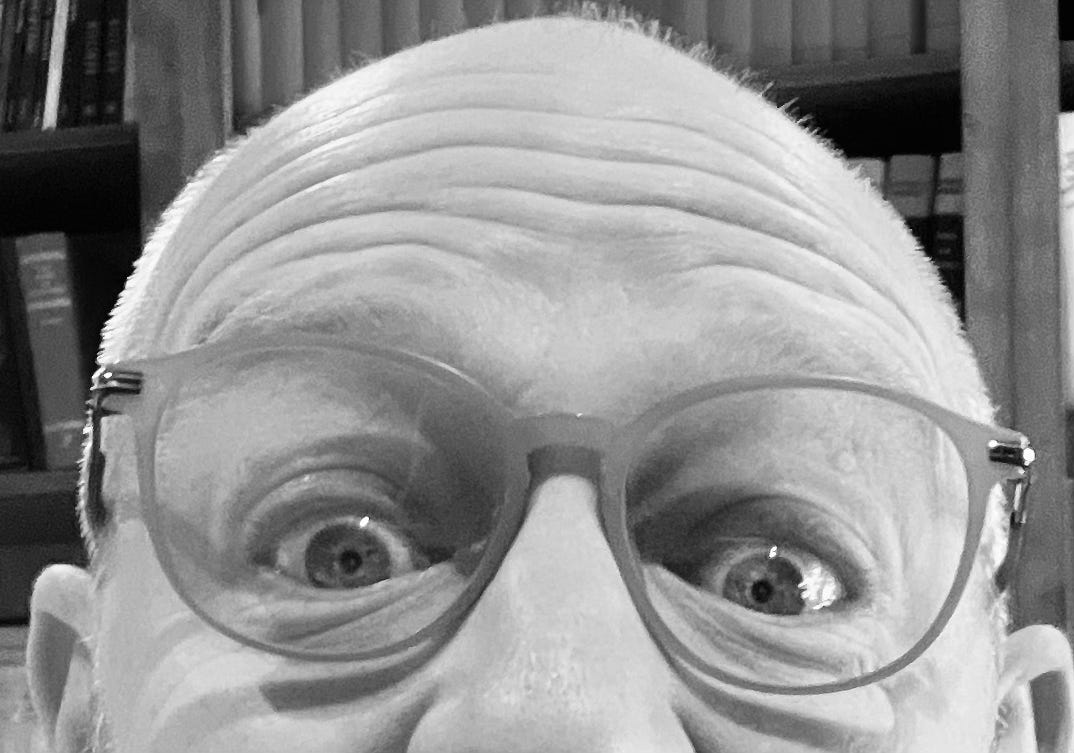Closing the gap
When our view of reality is different than real reality
When I was a kid, I really wanted glasses and my sister really wanted braces. Kirsten and I both got braces in adolescence, but I had to wait for my late 40’s for my desired glasses. Now I wish I didn’t need them. I’m literally seeing things differently now. I already have dyslexia, but add blurred vision when reading, and I easily read the wrong words. The most consequential one I misread was, “Love your enemas” when it actually said “love your enemies.” Oops–big difference!
There is often a gap between our view of reality and actual reality.
What are the primary influences that shape your view of reality? Social media has a whole industry of influencers–those who shape our view of the good life, or what we should or shouldn’t think or say. I deactivated Twitter before it was X. I deactivated Facebook and Instagram almost a year ago. You can read more about that here:
I don’t think I’m morally superior to others who still have social media. I actually think I’m worse. I wasn’t able to tell FB what to do, FB told me what to do. I was tired of being under its influence. Nearly a year of sobriety has shown me my addictive need to know what was going on NOW, to practice snap judgment, to cultivate anger toward people who voted/thought/believed/responded differently. It disordered my longing to be obedient to Jesus who said, “love your enemies” (Matthew 5.43-44). It shaped me–actually misshaped me. My view of reality was perverted by my overuse of social media. I had lots of friends, but was kind of lonely. I got ‘likes’ but never enough. Reality for me a year ago didn’t have much smell or texture or nuance. It was more one dimensional. Flat. Now my reality is realer: three-dimensional, textured, beautiful, complicated.
I talk to a lot of pastors, and many have a consistent concern that sounds something like this, “How can I disciple the flock God has called me to, when I get them for maybe 1 hour a week, but their favorite news station or social media site gets them for 15 hours a week?” We are being discipled in the way of impatience and anger, in the way of triviality and amusement, in the way of violence and debauchery.
Vicar Mike is going to point us to Jesus this Sunday. The one who withholds nothing, not even his own flesh and blood from us. In Jesus, our sins, our addictions, our perversions, our idolatries are judged, condemned, dead, and buried. And, in Jesus, we are raised, forgiven, justified, and satisfied. In the resurrection of Jesus, the new creation is inaugurated, and in our baptism into Jesus, we too share in the new creation now! If anyone is in Christ, A NEW CREATION (2 Corinthians 5.17)!
Come Lord Jesus, shape us, form us, transform us and our view of reality to align with your view of reality. We want you to be our primary influencer. Amen!
How our view becomes realer:
Take a walk and notice elevation, smells, rhythms of the day or week you didn’t notice before.
Have a talk with a real person.
David Brooks suggests good listeners, people who actually want to know a person, are not “toppers,” or people who listen just to respond with a story of their own. “Well, wait til you hear what happened to me…” Henri Nouwen calls it, “Paying attention without intention.” I want to try to do less of that. Brooks suggests asking good questions, or as he calls it, “becoming a loud listener.” He draws a distinction between diminishers and illuminators: “Diminishers make people feel small and unseen. They see other people as things to be used, not persons to be befriended. They stereotype and ignore. They are so involved with themselves that others are not on their radar screen. Illuminators, on the other hand, have a persistent curiosity about other people…They shine the brightness of their care on people and make them feel bigger, deeper, respected, lit up.”I plan to practice getting better at being a loud listener. Here are some of David Brook’s favorite collection of questions:“What crossroads are you at?”
“If this five years of your life is a chapter, what is it about?”
“What would you do if you weren’t afraid?”
“How did you come to believe that?”
“What is your favorite unimportant thing about yourself?”
“Why you?”
Open God’s Word. The Torah shows forth the Creative Voice of the real world and its real people. The Historical books give an alternative perspective to reality that is often more than meets the eye. The Books of Poetry tell and pray reality slant. The Prophets re-describe reality with God at its blazing center (Peterson). The Gospels narrates the experience of having the Source and Goal of all reality in flesh, in real time, and in real places. The Epistles are notes to unreality, inviting the recipients to align with reality. Apocalyptic rips open the curtain that shrouds real reality giving the one with eyes to see the truest, most beautiful, good reality.
Join in the liturgy. Good liturgy brings us into the realest reality—the Kingdom of God. “The Orthodox liturgy begins with the solemn doxology: “Blessed is the Kingdom of the Father, the Son, and the Holy Spirit, now and ever, and unto the ages of ages.” From the beginning the destination is announced: the journey is to the Kingdom. This is where we are going—and not symbolically, but really.” Schmemann, 29.
I love what a group of English Roman Catholic musicians are doing with the Mass of Unity:



This is great! And I like the photo but didn’t recognise you until I looked closely!
You always post such good messages.